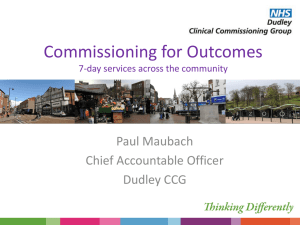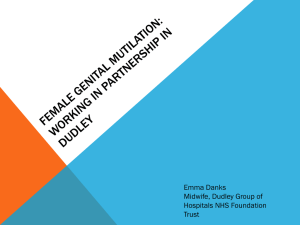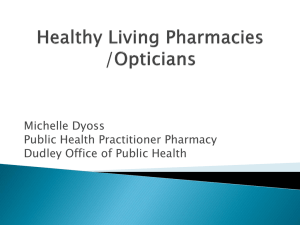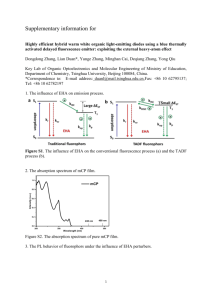Holistic thinking With vanguards getting into gear, Seamus Ward
advertisement
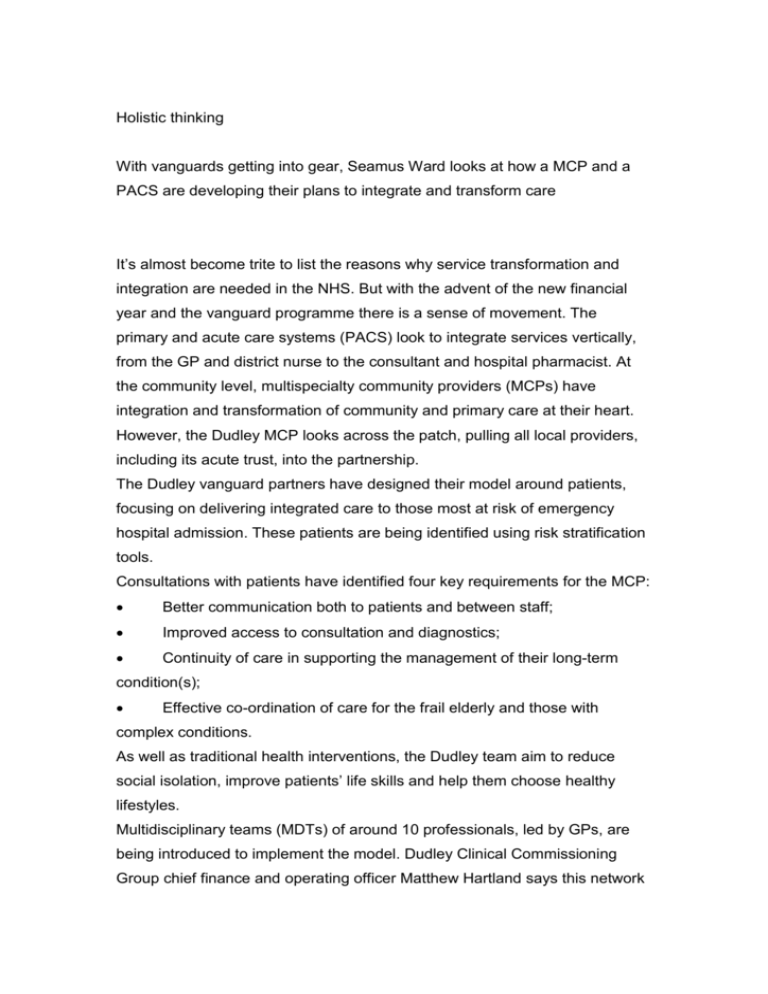
Holistic thinking With vanguards getting into gear, Seamus Ward looks at how a MCP and a PACS are developing their plans to integrate and transform care It’s almost become trite to list the reasons why service transformation and integration are needed in the NHS. But with the advent of the new financial year and the vanguard programme there is a sense of movement. The primary and acute care systems (PACS) look to integrate services vertically, from the GP and district nurse to the consultant and hospital pharmacist. At the community level, multispecialty community providers (MCPs) have integration and transformation of community and primary care at their heart. However, the Dudley MCP looks across the patch, pulling all local providers, including its acute trust, into the partnership. The Dudley vanguard partners have designed their model around patients, focusing on delivering integrated care to those most at risk of emergency hospital admission. These patients are being identified using risk stratification tools. Consultations with patients have identified four key requirements for the MCP: Better communication both to patients and between staff; Improved access to consultation and diagnostics; Continuity of care in supporting the management of their long-term condition(s); Effective co-ordination of care for the frail elderly and those with complex conditions. As well as traditional health interventions, the Dudley team aim to reduce social isolation, improve patients’ life skills and help them choose healthy lifestyles. Multidisciplinary teams (MDTs) of around 10 professionals, led by GPs, are being introduced to implement the model. Dudley Clinical Commissioning Group chief finance and operating officer Matthew Hartland says this network will enable health, social care and voluntary sector staff to work together in ‘teams without walls’. To enable best use of resources and economies of scale, Mr Hartland says the teams share resources and cover over a population of around 60,000. The vanguard has organised the GP practices and their associated MDTs into five localities. Each locality has a lead GP to co-ordinate the model of care. In turn, each MDT has a lead GP. The teams are associated with their practices and could also include a district nurse, assertive case manager, mental health worker and voluntary sector link worker. ‘We are one of the CCGs to take on full delegation of primary care commissioning with NHS England – another significant strength given the integral nature of primary care to the development and sustainability of our MCP model,’ Mr Hartland says. ‘All participating providers have restructured their services so that all front-line staff work to the same registered population as the GP practices or, for more specialist services, linking them in to the MDTs. ‘As a result of these changes we are seeing improvement in morale of our staff working across all agencies, because they are working better together. This is having consequential positive benefits on care to our patients. In addition our work with the voluntary sector is helping people connect back into their own communities, which is having a genuinely transformative effect on their lives.’ The second phase of the MCP development will see the care network expand to include specialist community services and some aspects of urgent care. This includes the establishment of a community-based rapid response service, designed to intervene in a crisis in the patient’s home. This should reduce the risk of A&E attendance and linking the patient back into their local network of care. The recently opened primary care urgent care centre is another element of the second phase. Co-located with Russells Hall Hospital A&E, it acts as a triage point for patients coming to the emergency department. Where appropriate, patients are diverted into primary care services, relieving pressure on the hospital A&E, which is one of the top-performing units in the country. The third phase focuses on bringing consultant-led services into the community. This ‘community retrieval’ will include consultants working alongside GPs to manage long-term conditions such as diabetes. Similarly, with consultant support, the practice-based MDTs will be responsible for the whole care pathway for frail, elderly patients – from community, into hospital and back into the community. ‘There are no longer any transfers of care. Patients will be retrieved back into the community rather than transferred from one team, or one organisation, to another – ensuring better co-ordinated care,’ Mr Hartland says. The CCG is acting as a lead commissioner, though there is significant input from partners and core elements are co-commissioned with the council under the better care fund. As lead organisation, the CCG has an overview of what services are needed now and in the future, Mr Hartland says. ‘This overview is also useful in working on the enablers of change – including a borough wide estates review, roll out of a single IT system and an overarching workforce plan, which transcends the organisational boundaries of the different agencies and professions in the system. ‘Ultimately we are creating a fully integrated, population-based organisation that is delivering better person-centred care and which is better connected into our local communities.’ The CFOO adds there are a number of financial aspects to the initiative. ‘We are currently in the process of undertaking financial modelling of the MCP, and how it will contribute to the financial sustainability of the health and social care economy. We are working with partners to map services to each phase of the model and will construct projected activity and financial flows for the next five years for primary care, our main acute and community providers and social care. ‘All of the financial modelling is being done with openness and transparency, involving all parties. The early hypothesis that such analysis is testing is that whilst the new model will not necessarily deliver a reduction in current cost, it will be mechanism to stem growth and make our whole health and social care economy more sustainable.’ With its acute provider, the CCG is also examining entire pathways in 8 specialties but are in active dialogue with acute consultants initially in ENT, Musculoskeletal, Ophthalmology and Urology with the aim to identify and reduce variation. Looking at 18 months of data, they are analysing each healthcare resource group to identify the number of patient interventions on the pathway, such as the number of appointments before or after a procedure, for example. It may be that some consultants have an outpatient appointment with a patient, then a follow-up before a procedure. Others may go straight to the procedure without the follow-up appointment. ‘We can see the most commonly used pathway, the variation that currently exists and decide what we will accept as a commissioner and where we need to understand the differences at a consultant or provider level. From that we can gauge the most appropriate ‘best practice tariff’ we are willing to pay and hopefully set that tariff for all providers,’ Mr Hartland says. ‘We are working with Monitor to identify how this could be implemented, but clinical agreement to the pathway is paramount’. Providers will also benefit from the joint work to identify the best pathways, he insists, as the aim is to also reduce costs for providers. The vanguard work is also underpinning the development of standardised best practice pathways for services outside the MCP. These will be commissioned in a way that incentivises optimum outcomes for the patient, maximises efficiency and enables effective communication back with the GP. This could include outcomes-based contracts, where outcomes (and the associated remuneration) will be the same for all providers in the model, be they primary or secondary care providers. ‘Those requiring care outside the remit of the MCP will benefit from the consistency, agreed outcomes and whole pathway focus that will characterise the way that care is commissioned, no matter who they choose as to provide it.’ Dudley is clearly thinking holistically, using its MCP not only to improve care for a specific group of patients, but also expanding it to provide better services for all its patients. Box: The Dudley partners The CCG’s bid for vanguard status brought together: Dudley Council Black Country Partnership NHS Foundation Trust Dudley Group NHS Foundation Trust Dudley and Walsall Mental Health Partnership NHS Trust Dudley Council for Voluntary Services and Local GP-provider company, Future Proof Health Ltd.
